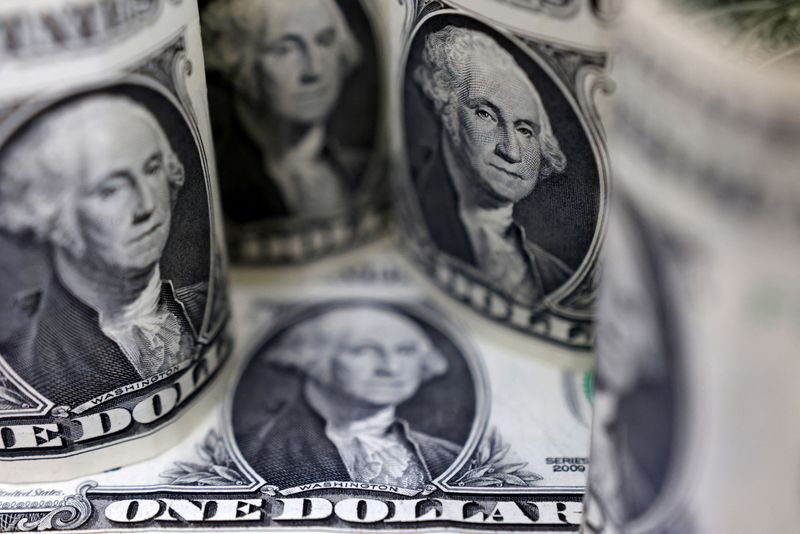By Gertrude Chavez-Dreyfuss
NEW YORK (Reuters) -The U.S. dollar rose on Friday, as earlier selling, amid a jobs report showing higher unemployment and modest job gains overall, lost momentum ahead of an inflation report next week that could either reinforce or cast doubts on interest rate cut expectations later this month.
The greenback recovered from a three-week low against the euro, which last traded down 0.3% at $1.0561. The European common currency was poised to end the week 0.2% lower, posting losses in four of the last five weeks.
Against the yen, the dollar advanced from session lows to trade little changed at 150 yen. The U.S. currency will end the week up 0.2% versus the Japanese unit, gaining in three of the last four weeks.
“Noisy (payrolls) report but soft enough to reinforce the positioning adjustment across FX,” Mark McCormick (NYSE:MKC), head of foreign exchange and emerging market strategy at TD Securities, wrote in a research note.
He noted that the U.S. dollar earlier followed Treasury yields lower, “reflecting the fact that the market sees enough here to expect another Fed cut this month.”
“ Next (LON:NXT) week’s CPI (consumer prices index) will likely be the last piece of useful data for the December Fed meeting, but we think the path of least resistance remains for some U.S. dollar weakness, offering a great opportunity to buy the dip in early 2025,” McCormick wrote.
Market participants earlier sold the dollar after data showed the unemployment rate inched higher to 4.2%, after holding at 4.1% for two straight months.
The increase in the jobless rate reflected weakness in household employment. The smaller and volatile household survey from which the unemployment rate is compiled showed a decline of 355,000 jobs. Household employment dropped in October as well.
Nonfarm payrolls, on the other hand, expanded by 227,000 jobs last month after rising an upwardly revised 36,000 in October, from 12,000. Average monthly job gains over the last four reports are now just below 150,000, short of what many economists feel is needed to provide enough work to match a growing population.
Economists polled by Reuters had forecast payrolls accelerating by 200,000 jobs last month. Estimates ranged from 155,000 to 275,000 jobs.
Bloomberg had forecasts of 225,000 jobs and some analysts cited that number to conclude that payrolls barely beat expectations, suggesting the Fed is not likely to pause in its easing cycle.
CONSUMER SENTIMENT
The dollar then shed losses after the University of Michigan Surveys for December showed consumer sentiment rising more than forecast while one-year inflation expectations rose to 2.9% from 2.6 last month.
In afternoon trading, the dollar index, which measures the greenback against six major currencies, climbed 0.3% to 106, after slipping toward a three-week low in the previous session.
The greenback also gained against the Swiss franc, up 0.1% at 0.8786 franc.
Post-payrolls, U.S. rate futures priced in an 85% chance the Fed will lower interest rates by 25 basis points at its policy meeting later this month, up from about 70% just before the data’s release, according to LSEG calculations.
The odds of a pause, meanwhile, dropped to 15% from 30% ahead of the jobs report.
“The Fed will indeed cut by 25-bp, just to keep policy moving from restrictive territory towards neutral,” James Knightley, chief international economist, U.S., at ING, wrote in a research note.
“However they are set to signal a slowing in the pace of cuts with a pause at the January FOMC meeting looking likely.”
The risk to that view, he noted, is next week’s core CPI print coming in hot. He said the consensus is for a 0.3% rise, but so long as that is closer to 0.25% rather than 0.349%, Knightley believes the Fed will indeed opt to cut on Dec. 18.
In Asia, the dollar rose versus South Korea’s won after local media reported the nation’s main opposition Democratic Party said lawmakers were on standby after receiving reports of another martial law declaration.
The won weakened, leaving the dollar up 0.4% at 1,422.7.
Elsewhere, China’s yuan was little changed against the dollar but headed for its 10th straight weekly loss amid concerns new tariffs threatened by U.S. President-elect Donald Trump will heighten strains on the struggling Chinese economy,
The dollar last changed hands at 7.2843 yuan in the offshore market, up 0.3%.

